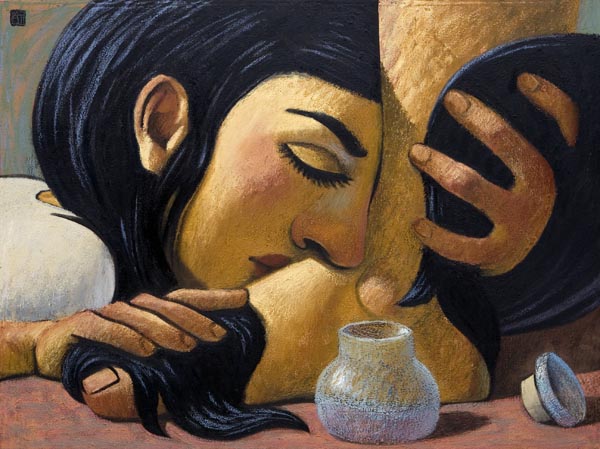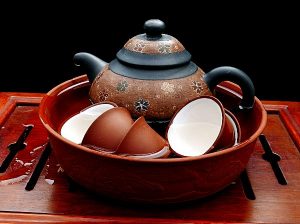 Drinking Chinese tea is an art. It’s also a form of hospitality. It is much more than just boiling water and plopping in a bag of jasmine tea. The water needs to be just the right temperature. The teapot, small and made of clay, should only be used with only one kind of tea and never washed, only rinsed. The flavor of the tea soaks into the pores of the teapot and enhances flavor over time.
Drinking Chinese tea is an art. It’s also a form of hospitality. It is much more than just boiling water and plopping in a bag of jasmine tea. The water needs to be just the right temperature. The teapot, small and made of clay, should only be used with only one kind of tea and never washed, only rinsed. The flavor of the tea soaks into the pores of the teapot and enhances flavor over time.
When brewing tea, the teapot is partially filled with loose leaves, which are then rinsed with near boiling water. The teapot is again filled with hot water and the leaves allowed to steep for just the right amount of time. When properly brewed, 5-7 pots of tea can be made from the same leaves, each batch with the same clarity and taste as the original. As pot after pot is poured, the leaves lose some of their flavor so each new brew requires a bit more steeping time than the last. Tiny cups are sipped while conversation unfolds, revealing its own intensity and flavor.
As I pondered this art I reflected on our lives as followers of Jesus. Like Chinese teapots, we’re each unique, fragile vessels created to contain one essence, that of our Creator. Over time the flavor of God intensifies in our lives as the Spirit seeps into our pores and transforms our nature, making us more like the Creator in whose image we are formed. Like the tea leaves, we are also unique, each variety requiring a different processing and brewing technique that results in the perfect cup of tea.
 When we first encounter the Risen Christ, a cleansing is in order. Like leaves rolled tightly into little balls and dried at the edge of the road, we’ve collected dust, dirt, and contaminants that alter our flavor. We are washed, not with lukewarm water or water heated in a microwave, but water heated to a boil over fire. As Jesus’ life is poured out on the cross, his life, love, and sacrifice infuse our lives, cleansing us of the filth that clings so closely in every wrinkle and crevice of our withered lives. Like the tightly rolled leaves, we expand, allowing God’s Spirit to reach more and more of our being. Rinsed in Christ, we are now ready to be used by God.
When we first encounter the Risen Christ, a cleansing is in order. Like leaves rolled tightly into little balls and dried at the edge of the road, we’ve collected dust, dirt, and contaminants that alter our flavor. We are washed, not with lukewarm water or water heated in a microwave, but water heated to a boil over fire. As Jesus’ life is poured out on the cross, his life, love, and sacrifice infuse our lives, cleansing us of the filth that clings so closely in every wrinkle and crevice of our withered lives. Like the tightly rolled leaves, we expand, allowing God’s Spirit to reach more and more of our being. Rinsed in Christ, we are now ready to be used by God.
When another type of tea is used in the pot, the flavor is corrupted. So it is with our lives, when we permit the flavor of God to mix with greed, nationalism, lust, and a whole host of other gods. When this happens the tea poured out tastes “off”. Something is wrong. The tea is called by the same name and even tastes similar, but the quality is distorted, reflecting something other than the intended brew.
Like each new cup, there is a consistency to God’s desire for us as well. Just as the tea leaves change with every pot, so our lives change as we grow in Christ. The same water fills the pot but each batch requires its own unique timing. We often get into religious ruts by assuming the way things have been done is the way they always should be done. But we fail to see that God’s been working in and around us, transforming God’s creation. Like finely brewed tea, the flavor and consistency of God hasn’t changed, we have. With each filling of our lives with the sacrificial love of Jesus, God’s “timing”, that variable which is the intersection of created with Creator, is adjusted.
Like tea, there is also a kind of faith that’s bagged and ready, even “instant”, promising the true taste of God without any real substance. These pre-packaged teas are quick and easy, but something is seriously lacking. Rushing toward the end, they’ve left out all the elements in-between that truly make tea what it is. Finely brewed tea involves patience as you sit together with friends conversing while the water is boiled. It involves allowing the leaves to be properly cleansed and to expand. It involves the act of service and attention as the brewer engages both the guests and the tea-making process. Like true faith, the art of drinking tea involves everything around us and is something to be lived and savored, not rushed.
As we take time with God and in community, our true flavor is revealed. Following in the path of our Lord, we find ourselves poured out into tiny cups all over the world — in fellowship, witness, service. When attention is paid to the brewing process, the clarity and consistency of each cup looks and tastes like Jesus, revealing through our fragile vessels and the content of our character the transforming love of God for all creation.
by Tom Sine
In a recent post on newchangemakers.com I encouraged readers to prepare for “change and opportunity.” In my upcoming posts I will invite you to join an unusual group of innovators who are imagining and creating a range of new ways to live and engage some of tomorrow’s challenges and create new forms of church.
These innovators are inviting all of us to become more serious followers of Jesus by joining them in creating: new forms of lifemaking, changemaking and churchmaking that both engage some of tomorrow’s new opportunities in ways that also more fully reflects the radical way of the servant Jesus.
Welcome to a decade of 2017 to 2027… changing at warp speed!
In January I mentioned Tom Friedman’s new book, Thank You For Being Late: An Optimistic Guide to Thriving in An Age of Accelerations. He argues convincingly, that the rate of change seems to be accelerating. He suggests that three of the forces causing this acceleration are:
- the explosive development of new forms of technology
- the rapid globalization of the planet
- the growing threat of climate change irrevocably threatening the well being of life on this planet.
I want to add a 4th.
We are also witnessing a growing wave of nationalism and populism that is sweeping through Europe destabilizing governments and relationships to other countries.
When I was speaking at the New Parish Conference in the UK in November I found that the British vote to leave the European Union is dividing both the society and the church. Since our presidential election in the US, we too are being impacted by this volatile movement. I suspect this movement is also accelerating the rate of change and political turbulence in other countries all over the planet.
We have a choice. We can allow this growing list of challenges to discourage us or we can view them as opportunities to imagine and create innovative new responses…that not only brings real change but a rising tide of hope as well!
A New Generation of Innovators
Welcome to a new generation of innovators who are creating new responses to new challenges and opportunity!
In each of these 10 posts for 2017 I will invite readers to join those who seek to create new forms of “lifemaking” to ignite their imaginations to create ways of living. Below, I’ll introduce you to Jensen Roll an inspiring innovator we can all learn from.
We will also share new forms of “changemaking”, to move beyond handouts, to working with neighbors by creating, not only new housing models, but also starting new social enterprises that provide our neighbors people a living wage.
Finally, we will also feature new forms of churchmaking that aren’t just focused on the needs of the gathered but increasingly learning how to become churches for others… devoted to serious changemaking with our neighbors… always throwing better parties.
A Future Challenge
The growing housing crisis in the coming decade for the poor, middle class and young innovators
Let’s start by looking at the challenge, in this coming decade, of the growing housing crisis facing the working poor, the middle class and increasingly the young….including young church planters, social entrepreneurs and under 35 innovators.
I find very few people over 50, including church leaders, recognize how drastically the housing market has changed for the under 35. This is particularly true for those young innovators who want to invest their lives in serious change making.
In Live Like You Give A Damn! Join the Changemaking Celebration I celebrate the welcome news that millennials are much more globally aware since they are the first digital generation. As a consequence they are much more aware of issues of economic, racial and environmental justice.
I also celebrate the even better news that a higher percentage of them want to invest their lives in creative new forms of urban empowerment, environmental innovation and planting churches that don’t simply exist for the gathered but for serious neighborhood changemaking as well.
However, millennials are facing the double whammy of the highest school debt ever and the highest housing costs in most markets in the US. I talked to a young church planter who has no idea how he will ever be able to pay off $90,000 debt for his M Div degree and then purchase the kind of suburban house he was raised in.
Some of these young leaders also tell us it is even harder to imagine a way to enable the working poor in their neighborhood to ever reach the place of buying their own home…given the forecasts that housing prices are likely to rise faster than peoples incomes in the next ten years.
In contrast, I bought my first house in Portland in 1962, a newly restored 1920s four bedroom, two bath bungalow with an unfinished basement for $14,000 with $100 a month payments. Even though my salary at a Christian college was barely above a monthly public welfare check I had no problem making the hosing payments. For my generation the costs of housing was dirt cheap and school debt was virtually unheard of.
Jensen Roll’s Housing Solution
Meet Jensen Roll. He’s a 24 year old creating innovative housing options in an increasingly expensive housing market in these rapidly changing times
Jensen Roll is a friend of mine. I am fortunate, that as a young social entrepreneur, he often finds time to co-present with me. Jensen graduated with a degree in Social Enterprise from Elon University last May. I have enjoyed getting to know Jensen and I am so impressed with his innovative imagination.
Since Jensen wants to invest his life in creating new forms of social enterprise to help empower those at the margins he has been struggling with the cost of housing for himself as he is getting started as a social innovator.
This millennial ignited his imagination and came up with an intriguing idea. He approached Lowes hardware and persuade them to provide the building materials for him and his friends to construct a tiny House.
During his final semester at Elon University friends at school and church taught him how to weld the bottom frame with wheels on which to build the house. With the materials from Lowes and the help from his friends he was able to build his Tiny House for around $20,000. He and his bride plan to make their home in this mobile dwelling to reduce their living costs and increase their mobility. It includes a loft bedroom, kitchen, bath and a sitting area.
This experience sparked a new idea for him of how to help those with marginal incomes to also have the possibility of becoming home owners too. Jensen calls his innovation a Tiny House Village.
Welcome to the Tiny House / Big Village
Jensen has purchased ten acres within walking distance of the downtown of his hometown, Burlington North Carolina. He and his collaborators plan to construct a 50 unit Tiny House Village for low income clients many of whom never expected to be able to own their own home. It will operate like a co-housing community with a common garden and other forms of cooperation. Jensen is working with the local leaders in Burlington to fashion land use policies that ensure these tiny houses on skids conform to the local codes.
Jensen’s plan is to build fifty 350 square foot tiny houses with sleeping loft, kitchen, bathroom and sitting room for $50,000 each. If tenants pay their monthly rent for 5 years they will own their own home.
Can you see how even tomorrow’s most daunting challenges are really new opportunities to invite the creator God to ignite our imaginations to create innovative responses.
Your Invitation to Changemaking
I want to hear not only your response to this post but even more importantly to hear your innovative ideas for lifemaking, changemaking and churchmaking. What are your new ways to engage one of tomorrow’s new opportunities in ways that reflects something of the radical compassion of Jesus…and makes a real difference in the lives of others?
This is your invitation to join this ongoing conversation by sharing with us, and our other readers, your new innovations and your best ideas of how to address some of tomorrow’s new challenges and opportunities of a world changing at warp speed. This is your invitation to discover the satisfaction of God using our mustard seeds to make a little difference in times like these.
Write us at www.newchangemakers.com and share the creative ways God is using your mustard seeds to make a little difference in these troubled times.
photo credit: http://wayneforte.com/picture/anointing-his-feet-2/
by Christine Sine
I was reading through this old post today and felt that it flowed very well from yesterday’s post so decided to reblog it. Enjoy!
Meanwhile, Jesus was in Bethany at the home of Simon, a man who had previously had leprosy. While he was eating, a woman came in with a beautiful alabaster jar of expensive perfume made from essence of nard. She broke open the jar and poured the perfume over his head. Some of those at the table were indignant. “Why waste such expensive perfume?” they asked. “It could have been sold for a year’s wages and the money given to the poor!” So they scolded her harshly.
“Who was this woman?” We know where it occurred, the extravagant cost of the perfume and even the container that it was in, we do not know for sure who she was though. There has been much speculation over the centuries about who and what she was but no one can be sure. Most people assume the worst and think that she was a prostitute, as Luke suggests or it might have been Mary as John suggests. To the disdain and rejection shown by those eating at table with Jesus we add our own disdain and rejection to this woman.
Possibly her rejection was just because she was a woman. We forget that in Jesus time and culture women did not eat together with men. Perhaps she was rejected because she made the dinner guests feel uncomfortable – the generosity and extravagance of her gift might have been contrasted with their own lack of giving. Or perhaps she was someone unacceptable within the society – if not a prostitute then maybe ill or poor, or maybe she was a Gentile. We don’t know for sure.
What is Your Response?
All of us have times when we feel like this woman kneeling at Jesus feet. We want to share our loving gifts lavishly, but feel that they are unappreciated or misunderstood.
Sit quietly for a few minutes and think back over your own life. Remind yourself of situations in which you have felt misunderstood and unappreciated. Now imagine Jesus taking up your gift with love and gratitude, fully appreciative of all that you have done.
Write down your response.
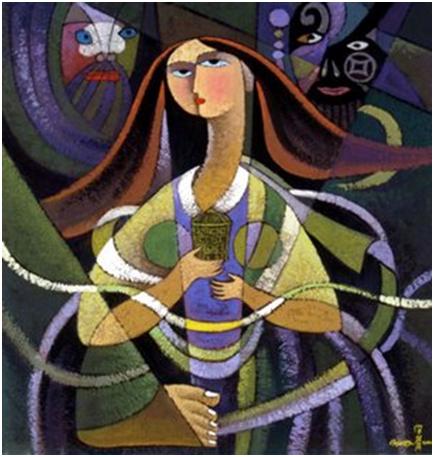
He Qi Woman anointing Jesus Feet http://www.heqiart.com/
This story occurs just a couple of days before the Last Supper and the foretaste of the communion feast. I wondered is this because this story challenges us to think about all those that we still exclude from our table fellowship. Jesus has embraced the outcasts and is eating at their table – the tax collectors, and Simon the leper are there but they are unwilling to welcome this woman.
I think that this woman is unnamed because she represents all the nameless and rejected ones in our society whom we still refuse to welcome to our table – people that we aren’t willing to listen to because they are different from us or unacceptable in our own Christian culture.
What is your response:
Who, I wondered are we still unwilling to welcome to our table? Whose voices are we unwilling to listen to and whose offerings are we unwilling to embrace?
Sit quietly for a couple of minutes with your eyes closed. Imagine your dining room table with a group of friends around it. Who would you invite? Who would feel excluded and why? Write down your impressions. Listen to the song below. What would it take for you to live in God’s freedom and come to God’s table as this song suggests? Pray about your responses and ask God if there is anything you need to change.
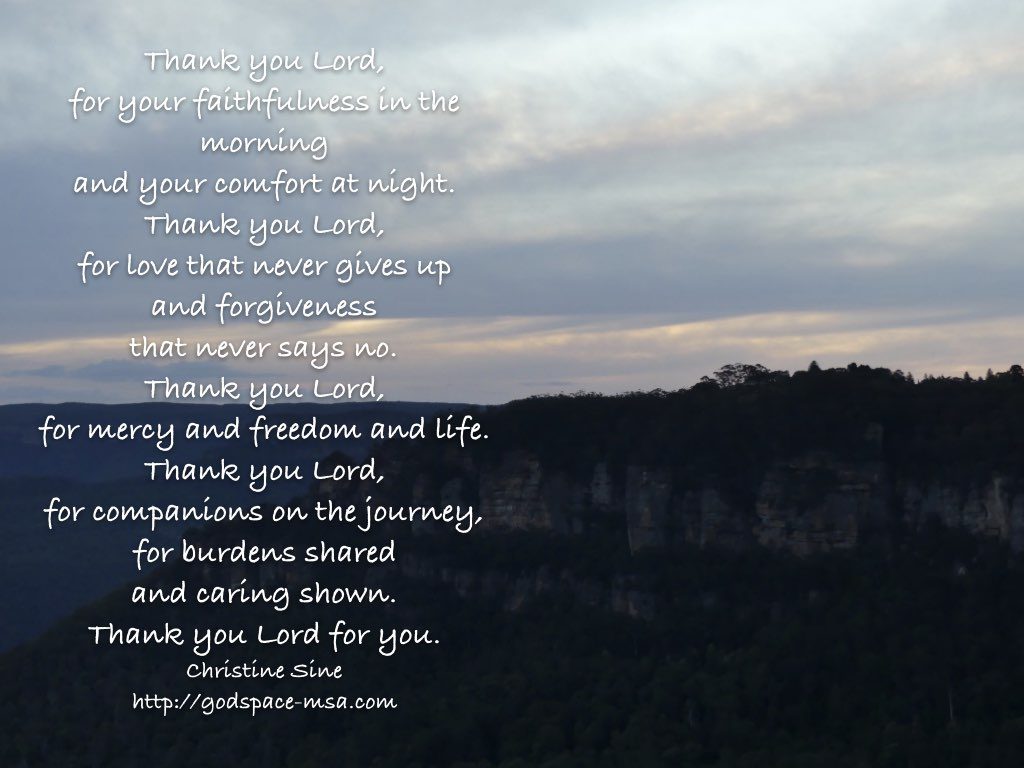
by Christine Sine
Over the last few months, Tom and I have been reading The Gratitude Diaries together. The author Janice tells of her year long experiment with gratitude. She took a different shares of her life each month and explored ways to express gratitude in that area. It is a well researched book and has given me much to think about.
In part of last week’s readings she talked about an interview she conducted with psychiatrist Jeffrey Huffman who told her that writing a letter of gratitude is the single most effective positive intervention they found for people who are depressed, hopeless and suicidal. He thought that was because gratitude turned our attention outward helping us to remember that we have connections and people who care about us.
“Realizing that someone did something kind gives so many positive emotions to unpack! If your being grateful you must have been worthy enough for someone to pay attention to you.. You do have somebody in the world who cares about you, and your not alone. The feeling of gratitude can have a profound effect on someone who is feeling isolated and worthless” (281)
I have been a strong advocate for incorporating gratitude into my weekly spiritual disciplines ever since I read Ann Voskamp’s book One Thousand Gifts several years ago. One of my Sabbath questions is What are you grateful for this week? I have also added a week of gratitude to the beginning of Advent as a special celebration. This has helped me negotiate many storms and focus on the hope and joy of the life I am privileged to live. Expressing gratitude has changed me dramatically, both making me more aware of the love of others and empowering me to express love for others.
What Are We Grateful for?
No wonder the central sacrament of our faith, communion, is sometimes called the Great Thanksgiving. This is the place where all followers of Jesus are invited to gather and share fellowship with each other as we remember and respond to the Eternal One who gave everything to draw us back into the embrace of divine love.
The great thanksgiving – but what am I grateful for as I partake? To be honest this was not a question I have really asked myself before. But as I thought about it today a great list came together and my joy overflowed.
I am grateful for the Christ who came in the flesh to show us the face of a God of love and compassion and generosity.
I am grateful for the sacrifices Jesus willing made, allowing his body to be broken and his blood to be shed so that we could be set free.
I am grateful for all who take communion and partake of the Eucharist together, not just in my congregation but but across the world – people from every tribe and nation and culture, rich and poor, disabled and whole, well thought of and despised.
I am grateful for those who have gone before, leaving footprints for me to follow that challenge me to a deeper level of action for justice, healing, love and compassion.
I am grateful for those who will come after and continue the healing work that God has begun.
I am grateful for the bread and the wine, for the earth that grew the flour and grapes, for the human hands that shaped them.
I am grateful for the God who reached into the soil of the earth and molded it beings responsible to steward and look after this earth.
I am grateful for the fact that each human being is infused with part of the essence and image of God. This we see now in part but one day will see it emerge in its fullness, brought to wholeness through the work of the renewing and restoring spirit of God who lives within all of us.
What is Your Response?
As we approach Holy Week and Jesus’ walk to Jerusalem and the Last Supper he shared with his followers which gave birth to the sacrament of communion, it seems like a great time to remember to be grateful for all God has done for us. Watch the video below. Close your eyes and remind yourself of the last time you took communion. Imagine yourself back at the table. Who is with you, both physically standing by you and in your imagination as you think of all those gathered around the world and throughout time? How does it make you feel? What are you grateful for?
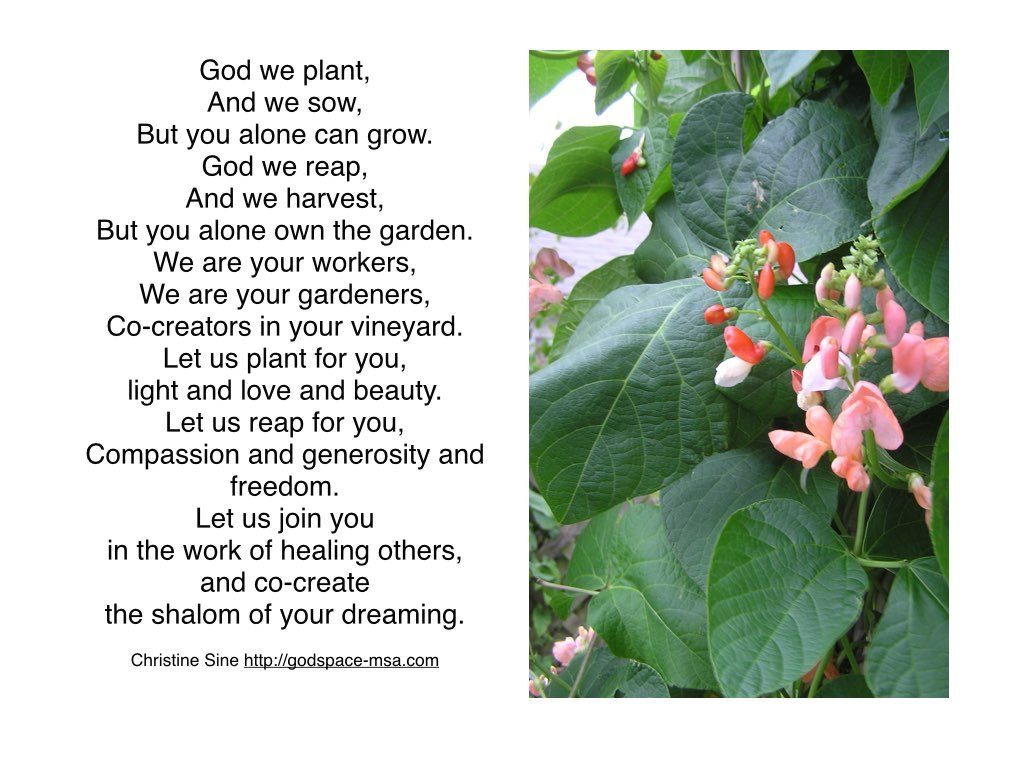
by Christine Sine
Sunday was the first sunny day we have had in Seattle for a long time. Tom and I walked around Greenlake, rejoicing in the daffodils with smiling faces shining in the sun. My soul is singing as I rejoice in the beauty of God’s creation in this springtime glory just beginning to emerge.
I often find myself conflicted between the season of Lent with its sense of deprivation and the rejoicing of spring and the wonder of what is happening in my garden. There is a tension here that I have found challenging to reconcile. But this year as I have focused on Lent as preparation for transformation, not time for denial and sacrifice, the tension resolved.
The world is getting ready for transformation and by the grace of God I am able to join in. In the garden I am tilling the soil, loading it with compost and planting the seeds in the depths of the rich, dark soil. Each seed I plant is a promise filled with the hope that it will germinate and be transformed into new life.
There are other promises that the spring planting season brings with it. In many countries starvation and hunger are seasonal. It is during this time of the year, when the stored harvest is depleted that poor families are most reliant on dried seeds, nuts and beans that they eke out with the hope that the new harvest will begin before their stores are finished.
Each seed planted bears with it a hope for transformation, a longing not just for the new growth but for the first fruits, the first sprouts that can be eaten and renew life. For some the greatest seal of hopelessness is when they need to use their seeds as food to survive, forcing themselves into hunger and starvation for next year too.
In my heart I am longing for the same germination of new life that has been planted in my soul. I long to see the new sprouts, the promise of a new harvest that I am beginning to catch glimmers of. How often I wonder have I eaten those seeds instead and denied God the ability to grow a new crop in my heart.
The giving of first fruits in cultures that lived on the edge of starvation during the season between planting and harvest must have been a huge sacrifice, an incredible denial of their own needs for nourishment so that their commitment to God could be fed and nourished first. Maybe that is what the denial of Lent is meant to be about. This is indeed a season to put the needs of God, and of others, and of the creation as well, before our own. This is the season above all others when we need to nourish the seeds of God’s transformation and allow it to grow and flourish.
As I work in the garden this week I know that my reflections will continue to revolve around the ongoing transformation God wants to accomplish in my life. Here are the questions I am asking myself:
Where has God planted seeds that have still not sprouted and need to be nurtured? Where have I failed to plant seeds because of a scarcity mentality, feeling that I will starve if I keep back some for next year’s harvest? And where have failed to give God the first fruits because I am so longing for new produce for myself?
Adapted from Springtime in my Soul
There are many current events that sap our emotions and threaten to drain our pool of empathy. Many refer to this as “compassion fatigue”. We arrive at this destination often from a lack of self-care rather  than a lack of love. We also arrive there when, as people of faith, we begin with activism rather than centering our hearts and minds in Christ.
than a lack of love. We also arrive there when, as people of faith, we begin with activism rather than centering our hearts and minds in Christ.
Over the years many have written about the relationship between contemplation and action. My first exposure to this idea of contemplative activism was in Thomas Merton’s book Contemplation in a World of Action, first published in 1965. Here is how he frames this relationship:
What is the relation of this [contemplation] to action? Simply this. He who attempts and acts to do things for others or for the world without deepening his own self-understanding, freedom, integrity, and capacity to love, will not have anything to give others. He will communicate to them nothing but the contagion of his own obsessions, his aggressiveness, his ego-centered ambitions, his delusions about ends and means, his doctrinaire prejudices and ideas. There is nothing more tragic in the modern world than the misuse of power and action to which men are driven by their own Faustian misunderstandings and misapprehensions. (Thomas Merton, Contemplation in a World of Action, pp. 178-179.)
Injustice and pain in the world remind me of Jesus’ responses as recorded in scripture and, as I read about Jesus’ life, current injustices and divisions come to mind. There is a kind of circular movement toward Christ, toward others, and back toward Christ. The grounding of action in the One who holds the power to reconcile all things, bringing shalom to the nooks and crannies of our world, renews my spirit.
But more than that, first grounding myself in Christ changes how I perceive the world. To the point Merton addresses, when we begin anywhere other than Jesus, our only option is to ground our action in ourselves; our broken, confused, ego-centered selves.
I wrote the poem below in 1992. In it I attempt to address the issue of inaction in the face of injustice.
Love’s Darkest Hour
The antithesis of love’s not hate
for hate is love gone sour
but when, unmoved, we fail to act
this is love’s darkest hour
All around us lives despair
we fail to question why
this is the act that loves the least
and makes our souls run dry
Not to reflect on our own lives
and change for those in need
this seems to me love’s greatest foe
its name is Apathy
AFWade 6/12/1992
- What is your response to injustice?
- Does your time in prayer and contemplation prepare you for action?
- Does your action drive you back to prayer and contemplation?
- How do you combat “compassion fatigue” or a tendency toward apathy?
A Few Resources for Contemplative Activism
- Fuel Radio interview with Christine Sine
- The Center for Action and Contemplation – Richard Rohr
- Gravity Center for Contemplative Activism – Phileena and Chris Heuertz
Cynthia Helton —
As I begin this, I want to state outright that I am not a member of clergy. I have no theological training – no experience in ministry – no expertise whatsoever in leadership in the institutional church. I say this not to diminish the validity of what I’m about to write; but to express most sincerely that my words as an ordinary person struggling to stay in the light might possibly speak more directly to any reader who is in the same boat as me.
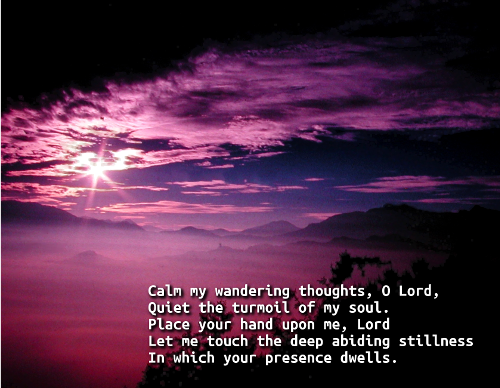
2013 Prayer Card – Christine Sine, Godspace. Photo – Andy Wade
In addition, at first what I write here might seem a bit scandalous; but hopefully – if you stay with me to the end – you may find your own bit of clarity that can help you make sense of questions you may have never voiced.
First though, in way of setting the stage for where I want to go with this, it may be helpful to explain where I’m coming from. I was raised Roman Catholic, but because of “bumps in the road” that ostracized me from the church, I found a ledge to stand on for a number of years in the Episcopal Church.
As life will do, especially as the autumn years turn to winter, circumstances and limitations often make room for introspection – sometimes opening up cracks in the validity of everything you’ve believed. At least, that’s what happened to me – especially when it comes to organized religion.
Because I’m blessed with a wise Anam Cara, a soul friend who is also my Spiritual Director, I listened when God used him to make this simple suggestion: “When you lose your way, go back to your roots.” This, coupled with Pope Francis’ compassionate invitation to those of us who have been estranged from the Roman church to return, I’m giving it a try – albeit from a guarded position.
The Roman Catholic Church, like many denominations, is an extremely symbolic church. All the “bells and smells,” the visual aids of contemplation found in statues and crucifixes, the liturgy and music are tools meant to accentuate our experience of God in the time we’re sitting in the pews. For most of my life it worked too; but the time came when I just needed more.
As oftentimes is the case, an inner quest for something more meaningful starts out with judging and criticizing. Case in point: I started to shrink from things that would draw attention; that could be used to “advertise” Christianity; that could showboat the “outside of a person’s cup” while the dregs of ego settled to the bottom. Even the simple act of wearing a cross around my neck felt arrogant, showy, even “vulgar.” A sign or bumper sticker on a car … forget about it!
But then, as God does, something came over me – right in the throws of my hysterical judgmental “hissy fit” …which I was almost enjoying. Trying to have some semblance of a Lenten observance, I came across an explanation of the crucifixion that knocked the wind out of my sails. To quote Richard Rohr:
The compassionate holding of essential meaninglessness and tragedy, as Jesus does on the cross, is the final and triumphant resolution of all the dichotomies that we ourselves must face in our own lives.
In other words, all the suffering we encounter, whether by our own choices or as the result of the brutality of the free will of others; all the tragedy that comes from the realistic and inevitable result of forces outside our control (illness, birth defects, natural disasters), are all held in an embrace – depicted in the outstretched arms of Jesus hanging on the cross. Jesus, in my opinion, was not a sacrifice of an innocent lamb to a vengeful god! He did not “pay the price” for our sins! His life was not a “ransom” for our own!
[Stay with me here just for a few more lines.]
Jesus suffered all the horrendous treatment by both the religious leaders as well as the Romans who actually put him to death to exemplify the truth that we never “read to the end of the story!” We get so caught up with the details, we miss the “connector” …the bridge that actually leads to resurrection: His then … ours now. Jesus’ arms are embracing his accusers and torturers with compassion that was “chosen.” In that choice, all bitterness and anger dissolve.
His purpose for dying on the cross was to show us that by accepting the paradoxes and sufferings of life with compassion, we will be free – we will be “saved” to live a new life of resurrection. This isn’t some “pie in the sky” notion that we will welcome trouble or tragedy into our lives with open arms! We will still be sad or devastated or angry or afraid (surely in his humanness, Jesus was all that and more!) …. but with the intention of accepting what’s on our plate with compassion, we will make it through – we will know resurrection – we will experience the love of God – and we will be “resurrected” many times before our lives on this earthly plane are over. To me, this is the purpose of why Jesus lived – and died.
Truly it is God’s grace that gives us the urge to have that intention in the first place; but how often we brush aside the “Butterfly” from our sleeve … run from the “Hound of Heaven” … crouch low to avoid the “Wind of the Wild Goose.” It’s so very easy to miss God’s promptings. In my own case, how very shallow and egotistical my view has been.
Perhaps, though, I needed to be that way so that in finally recognizing my ignorance – by looking at it with compassion now that a better way has been revealed to me – I can truly begin to cherish the “cross” in whatever form I find it. Whether it is on the back of a truck – the median of a highway – the wall of a church – hanging around someone’s neck …. wherever! … it will cause me to pause; to take a breath and remember to embrace my own life’s paradox with compassion as I walk along the way toward my own resurrection.
As an Amazon Associate, I receive a small amount for purchases made through appropriate links.
Thank you for supporting Godspace in this way.
When referencing or quoting Godspace Light, please be sure to include the Author (Christine Sine unless otherwise noted), the Title of the article or resource, the Source link where appropriate, and ©Godspacelight.com. Thank you!




